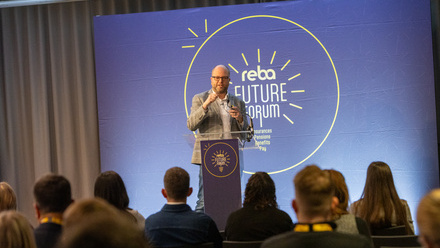Rethinking workplace savings: why pensions need to be part of the bigger picture

Steve Watson, head of proposition at Smarterly, believes that the issue is not with pensions themselves, but rather that they need to be part of a wider workplace savings solution that addresses the financial concerns of all employees. Particularly when unprecedented events such as COVID-19 occur, employees need to feel reassurance and security in the workplace, and helping them build financial resilience to prepare for any unexpected event is critical to that feeling. This is just one of the reasons why employers, and the pensions industry, need to rethink workplace savings.
Are pensions fit for purpose?
In short, no. It is true that pensions fulfil their primary objective; they provide a vehicle for retirement funding and they meet the regulatory and legislative requirements. But do they deliver return on investment for employers by engaging employees? In most cases, they don’t.
“Low pension engagement rates are a problem for employers because, especially post auto-enrolment (AE), next to payroll pensions are the second largest people cost, and you need to get a return on that investment. And the only way you can indicate whether you are getting a return is through the engagement rate. Quite simply, low engagement rates equate to a low return on investment,” says Watson.
Smarterly’s research A need for real change highlights how dissatisfied employers are with their current pension arrangements. The majority (94%) of respondents stated that they face challenges of one sort or another with their current pension scheme, with problems ranging from low engagement through to more practical administration issues.
Employers are also crying out for alternatives. More than 60% of respondent employers agreed that “current pension providers do not do enough to offer new, progressive products”, while a similar figure would like to see a new disruptor in the pension provider space.
Watson, who has more than 30 years’ experience in the pensions market, argues that – other than regulation changes – there has been little innovation since 1988 when personal pensions were introduced, which is why we still bang the drum about engagement. And it’s not just the lack of innovation that goes against pensions.
“Fundamentally pensions are no more complex than an ISA, but the legislation and regulations behind a pension make it feel complex. And people don’t engage with complex things unless they have to,” says Watson.
“I do think pension providers could do more to disguise the complexity and simplify the members’ journey and simplify the messaging.”
What employees really want
Pensions are one dimensional, they are for a specific event – retirement – and for a lot of employees that retirement event can feel a long way off, especially when they have more immediate financial priorities.
Smarterly’s Realigning the workplace savings offering to meet the needs of millennials research vividly highlights how disengaged employees, particularly millennials, are with their pensions. The research ranked the financial concerns of this cohort in the following order: learning how to save, buying a house, managing debt, managing expenses, retirement.
It’s these broader financial issues which mean employees are not in a position to think about retirement funds. To really highlight why millennials show little to no engagement with pensions, Watson refers to Maslow’s hierarchy of needs, which uses a pyramid to illustrate that fundamental needs must be met before an individual can become motivated to achieve higher level needs.
“If you applied Maslow’s hierarchy of needs…and the base of the pyramid is learning how to save and the apex is retirement, and in between there are all these other things, then yes, those things need to be addressed before an employee can even think about retirement,” explains Watson.
He believes that it won’t matter how much you communicate about the pension, it won’t make a wholesale difference to engagement rates because it does not address employees’ current financial priorities.
What will make a difference
The research showed a disconnect between what employers believe employees’ financial priorities are (pension schemes) and the reality (how to save consistently). There are a whole host of reasons for that, from employers projecting their own experience onto employees, through to pre-conceived ideas about what they want and paternalism.
“Anecdotally, it’s not that younger employees believe pensions aren’t important, it’s just that right now they’re not a priority – there are other things they are worrying about. And these other things are major and they need help with that,” says Watson.
“Employers are starting to understand this predicament, and financial wellbeing programmes are helping with that. We’re seeing a move away from a pension-centred approach to a more holistic work-based savings approach,” explains Watson. “What that means is we are contributing not to a workplace pensions scheme but to a workplace savings scheme. Some of that, probably the majority, goes into retirement funding and some of it goes into accessible workplace savings.”
This idea of dividing pension contributions into short (an ISA) and long-term (pension) savings – pension re-direct – gives employees choice about what to do with contributions over and above AE minimums. Yet, some employers have been concerned about granting employees too much access to these savings – after all, pension contributions are meant to be for the future – which comes back to the idea of paternalism.
However, Watson argues that employers really need to listen to their staff and not impose their own experiences, as the financial needs of employees are going to be as diverse as the workforce. And this is where pensions – as a one dimensional product – are no longer ideal.
“The pension re-direct concept will, at some point, become the norm. It only makes sense. The speed of that change depends on how quickly employers change their thinking. They need to bridge that difference between what they think and what their employees really want,” says Watson.
The future of workplace savings
Although there has not been much innovation in the pensions market, things are beginning to change. In 2018, Nest Insight, the research unit of pension provider Nest, began trialling its sidecar savings scheme. The savings tool enables employees to make an additional contribution each pay period into a separate emergency savings jar. Once the balance reaches their savings target, those additional payments will flow into their pension pot, on top of their normal pension contributions, to help them save more for retirement. If the employee takes money out of their emergency savings jar, the additional payments will start going into the emergency jar again until the saving target is reached.
Not only does this scheme recognise that the UK has a problem with accessible savings, but it also increases engagement with the pension, because every time you look at your savings jar, you’re also looking at your pension.
“I think, and other employers think, that this isn’t going far enough,” says Watson. “It is right – it’s right to have an emergency cash pot. But you’re still not dealing with the other main life events that young people go through and need financial help with before retirement. This is why the pension re-direct is the more holistic approach.
“Financial wellbeing as a concept is already becoming the norm and that by its very nature is opening up the diverse needs of employees. Of course, the whole point of financial wellbeing is about identifying needs and addressing them, otherwise why bother? Financial wellbeing will drive the change,” he concludes.
The author is Dawn Lewis, content editor at REBA.
Supplied by REBA Associate Member, NatWest Cushon
NatWest Cushon is a workplace pensions and savings provider with an award-winning proposition.







